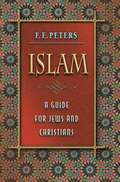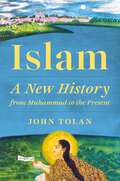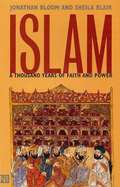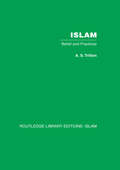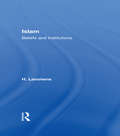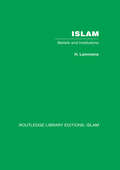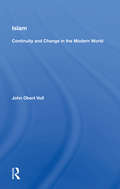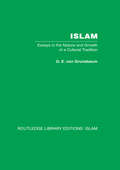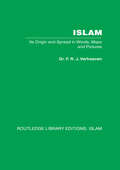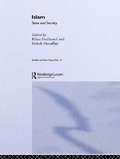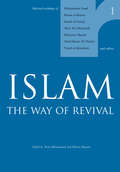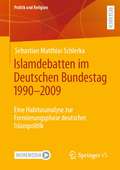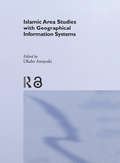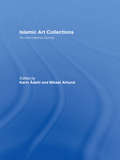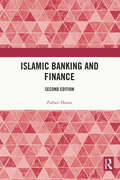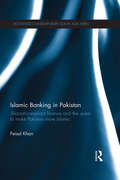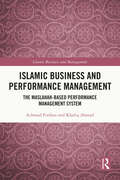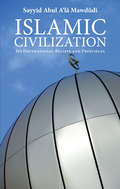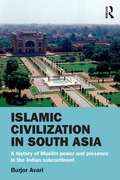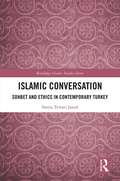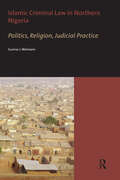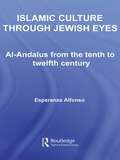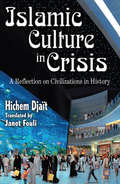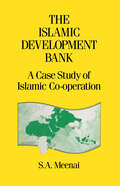- Table View
- List View
Islam: A Guide for Jews and Christians (Princeton Classic Editions Ser.)
by Francis Edward PetersThe Quran is a sacred book with profound, and familiar, Old and New Testament resonances. And the message it promulgated, Islam, came of age during an extraordinarily rich era of interaction among monotheists. Jews, Christians, and Muslims not only worshipped the same God, but shared aspirations, operated in the same social and economic environment, and sometimes lived side by side, indistinguishable by language, costume, or manners. Today, of course, little of this commonality is apparent, and Islam is poorly understood by most non-Muslims. Entering Islam through the same biblical door Muhammad did, this book introduces readers with Christian or Jewish backgrounds to one of the world's largest, most active, and--in the West--least understood religions. Frank Peters, one of the world's leading authorities on the monotheistic religions, starts with the central feature of Muslim faith and life: the Quran. Across its pages move Adam, Noah, Abraham, David, Solomon, John the Baptist, Jesus, and the Virgin Mary. The Quran contains remarkably familiar accounts of Genesis, the Flood, Exodus, the Virgin Birth, and other biblical events. But Peters also highlights Muhammad's very different use of Scripture and explains those elements of the Quran most alien to Western readers, from its didactic passages to its remarkable poetry. Peters goes on to cogently explain Islam's defining features--including the significance of Mecca, the manner of Muhammad's revelations, and the creation of the unique community of Muslims, all in relation to the Judeo-Christian tradition. He compares Jesus and Muhammad, describes Islamic commandments and rituals, details the structures of Sunni and Shi'ite communities, and lays out central Islamic beliefs on war, women, mysticism, and martyrdom. The result is a crucial and extremely accomplished book that offers Western readers a professional yet highly accessible understanding of Islam, and at a time when we need it most.
Islam: A New History from Muhammad to the Present
by John TolanA concise new narrative history of Islam that draws on the transformative insights of recent research to emphasize the diversity and dynamism of the traditionToday&’s Muslim world is in upheaval: legalists and mystics engage in intense debates, radical groups invoke Sharia, Muslim immigrants in the West face prejudice and discrimination, and Muslim feminists advocate new interpretations of the Koran. At the same time, Islam is mischaracterized as unitary and unchanging by people ranging from right-wing Western politicians claiming that Islam is incompatible with democracy to conservative Muslims dreaming of returning to the golden age of the prophet. Against this contentious backdrop, this book provides an essential and timely new history of the religion in all its astonishing richness and diversity as it has been practiced by Muslims around the world, from seventh-century Mecca to today.Most popular histories of Islam continue to repeat conventional pietistic accounts. In contrast, John Tolan draws on decades of new historical research that has transformed knowledge of the origins and development of the Muslim faith. He shows how the youngest of the three great monotheisms arose in close contact with Jewish, Christian, and other religious traditions in a mixture of cultures, including Arab, Greek, Persian, and Turkish; how Islam spread across an enormous territory encompassing hundreds of languages and cultures; how Muslims have forged widely different beliefs and practices over fourteen centuries; and how Islamic history provides crucial context for understanding contemporary debates in the Muslim world.At a time when much talk about Islam is filled with misunderstanding, stereotypes, and bias, this book provides a fresh and lucid portrait of the continuous and ongoing transformations of a religion of tremendous variety and complexity.
Islam: A Thousand Years of Faith and Power
by Jonathan Bloom Sheila S. BlairIn its first thousand years -- from the revelations to Muhammad in the seventh century to the great Islamic empires of the sixteenth -- Islamic civilization flourished. While Europeans suffered through the Dark Ages, Muslims in such cities as Jerusalem, Damascus, Alexandria, Fez, Tunis, Cairo, and Baghdad made remarkable advances in philosophy, science, medicine, literature, and art. This engrossing and accessible book explores the first millennium of Islamic culture, shattering stereotypes and enlightening readers about the events and achievements that have shaped contemporary Islamic civilization. Jonathan Bloom and Sheila Blair examine the rise of Islam, the life of Muhammad, and the Islamic principles of faith. They describe the golden age of the Abbasids, the Mongol invasions, and the great Ottoman, Safavid, and Mughal empires that emerged in their wake. Their narrative, complemented by excerpts of the Koran, poetry, biographies, inscriptions, travel guides, and even a thirteenth-century recipe, concludes with a brief epilogue that takes us to the twentieth century. Colorfully illustrated, this book is a wonderful introduction to the rich history of a civilization that still radically affects the world.
Islam: Belief and Practices
by A.S. TrittonOriginally published in 1951, this book provides a thorough explanation of the essential elements of Islam: Muhammad and the Quran, Faith, Prayer, Alms, Fasting, Pilgrimage, Holy War, Hadith, and Sunna, Creed, Prophets, Philosophy, Law, Sects, Mysticism, Social Life and Modern Movements.
Islam: Beliefs and Institutions
by H. LammensFirst Published in 1968. Routledge is an imprint of Taylor & Francis, an informa company.
Islam: Beliefs and Institutions
by Henri LammensIn this book, originally published in 1929, Lammens is primarily concerned with the problem of Mohammad’s personality and prophetic career – one of the central issues of Islamic history. He argues that Mohammad’s career must be considered within the context of the urban and mercantile society of seventeenth century Mecca and rejects the idea that Islam was principally the creation of a nomadic environment.
Islam: Continuity And Change In The Modern World (Contemporary Issues In The Middle East Ser.)
by John Obert VollThis book goes beyond the headlines to explore the broad dimensions of Islam, looking at the vitality of the main elements of the faith across the centuries and finding the basis of today's Islamic resurgence in the continuing interaction of varying styles of Islam—fundamentalist, conservative, adaptationist, and individualist—and in the way each o
Islam: Essays in the Nature and Growth of a Cultural Tradition
by G E von GrunebaumThe essays in this volume deal with three fundamental problems in Islamic civilization; the growth among Muslims of a consciousness of belonging to a culture; the unity of Muslim civilization as expressed in literature, political thought, attitude to science and urban structure; and the interaction of Islam with other civilizations.
Islam: Its Origin and Spread in Words, Maps and Pictures
by F R VerhoevenFirst published in 2008. Routledge is an imprint of Taylor & Francis, an informa company.
Islam: State And Society
by Klaus FerdinandPublished in the year, Islam: State And Society is a valuable contribution to the field of Middle Eastern Studies.
Islam: The Way of Revival
by Riza Mohammed Dilwar HussainIn this refreshingly different book one can relish the works and ideas of numerous Muslim scholars and leaders of the 20th century. The contributors include Muhammad Asad, Yusuf al-Qaradawi, Hasan al-Banna, Sayyid Qutb, Khurshid Ahmad and Sayyid Abul A'la Mawdudi.This title is especially useful for those seeking to enhance their understanding of Islam through personal and group study.
Islamdebatten im Deutschen Bundestag 1990–2009: Eine Habitusanalyse zur Formierungsphase deutscher Islampolitik (Politik und Religion)
by Sebastian Matthias SchlerkaSowohl anhand einer Vollerfassung aller Bundestags-Drucksachen und Plenarprotokolle aus den Jahren 1990-2009, in denen von Islam oder Muslim*innen die Rede ist, als auch anhand einer Habitusanalyse von vier ausgewählten Debatten – zum „Asylkompromiss“ 1993, zu einer außenpolitischen Islamkonferenz 1995, zur Streichung des Religionsprivilegs 2001 und zur Einsetzung der Deutschen Islamkonferenz 2006 – wird in diesem Buch herausgearbeitet, wie die Kategorien „Islam“ und „Muslim*innen“ von den Abgeordneten konstruiert werden. Dabei zeigt sich unter anderem, dass Muslim*innen durchgehend als Eingewanderte betrachtet werden, während der Islam mit potenzieller Bedrohung assoziiert wird.
Islamic Area Studies with Geographical Information Systems (New Horizons in Islamic Studies)
by Okabe AtsuyukiIn this volume the contributors use Geographical Information Systems (GIS) to reassess both historic and contemporary Asian countries and traditionally Islamic areas. This highly illustrated and comprehensive work highlights how GIS can be applied to the social sciences. With its description of how to process, construct and manage geographical data the book is ideal for the non-specialist looking for a new and refreshing way to approach Islamic area studies.
Islamic Art Collections: An International Survey
by Karin AdahlAn annotated index and general orientation of Islamic art collections in museums, libraries, other institutions and on private hands. Includes a short description of each collection, its main characteristics, documentation, publications and exhibitions.
Islamic Art and Archaeology in Palestine
by Myriam Rosen-AyalonDespite political upheavals under Muslim domination in the Middle Ages, Palestine was a center of great artistic activity recognized for its incredible dynamism. Its unique contribution to the Islamic “macrocosm,” however, never became the subject of extensive study. Numerous archeological excavations on this relatively small geographic area reveal the existence of extremely well preserved monuments of high architectural quality and exceptional religious value. This is what Myriam Rosen-Ayalon exposes in this thorough introduction to Palestinian Islamic art and archeology. In chronological order she presents here for the first time the multifaceted and long-lasting achievements of Islamic art in Palestine, filling the gap of years of neglect on the subject.
Islamic Banking and Finance: Second edition
by Hasan ZubairThis book discusses the nature and theories which govern systems of Islamic finance including its most distinctive features and its relationship with conventional financial institutions. It explores the nature and role of money in modern economies and elaborates on the process of credit deposit creation, trade cycles and instruments for the creation of value in financial markets through the perspectives of Islamic finance. The author explains its characteristics, especially the rationale for the lack of interest-based financial activities. He examines the intrinsic ethical and humanistic frameworks that govern financial theories and practices and the models for the creation of value, risk-sharing and socially responsible investing, as well as the governance and regulation that these systems follow. The author also does a comparative assessment of conventional financial systems with Islamic finance with relevant examples, assesses the performance of Islamic systems and examines existing and expanding markets for Islamic finance. Lucid and cogent, this book is useful for scholars and researchers of Islamic finance, Islamic studies, economics, banking and finance in general.
Islamic Banking in Pakistan: Shariah-Compliant Finance and the Quest to make Pakistan more Islamic (Routledge Contemporary South Asia Series)
by Feisal KhanIslamic Banking and Finance (IBF) has become a growing force over the past three decades, with Pakistan being one of the IBF pioneers by converting to an ‘interest-free’ banking system in 1985. However, since independence in 1947, there has been continual tension over Pakistan’s essential character, between Islamic Minimalists, who favour a Modernist interpretation of Islam, and those who favour an Islamic Maximalist interpretation that sees Pakistan as a model Islamic state. This book analyses the push to Islamize Pakistan and its financial system by Islamic revivalists, following the early 1947 debates in the original Constituent Assembly to the final 2002 ruling on IBF of the Shariat Appellate Bench of the Pakistan Supreme Court. It examines the practice and theory behind contemporary Islamic, "Shariah-compliant", banking. It offers extensive interviews with Pakistani Islamic bankers on the state of their industry and how they see it developing, and provides analysis on how the Islamic banks’ customers differ from those of conventional ones. Presenting a critical analysis of Pakistan’s IBF experience and offering a new insight into Pakistan’s banking industry that illustrates broader political and social trends in the country, this book will be of interest to specialists on Islam, South Asia and International Economics.
Islamic Business and Performance Management: The Maslahah-Based Performance Management System (Islamic Business and Management)
by Khaliq Ahmad Achmad FirdausThis unique book discovers a new dimension in the study of strategic and performance management in Islamic Business studies. It addresses the missing link of spirituality from modern-day organizational structure in the presence of high-tech pressure in all areas of human endeavours. The authors propose an integrated study of Islamic business approach to strategic and performance management systems to achieve sustainable organizational performance. The book explores employees’ wellbeing and organizations’ perceiving work environment as a spiritual pathway to cultivate values in Islamic business ecosystem to sustain humanity. It is all about care, empathy, and sustenance of others, about truthfulness and management being truthful to themselves and others and endeavouring to live their values more effusively while performing their work. The book stresses the impact of spirituality in performance management, concluding that for any organization to run efficiently, spirituality is the core component to attain happiness, contentment, and success. The book will be of interest to a variety of management scholars, including those researching and studying performance management, talent management, strategic management, and business ethics.
Islamic Civilization
by Sayyid Abul Mawdudi Syed AkifMawdudi argues that the true understanding of Islamic civilization is possible only by having access to the soul of that civilization and its underlying fundamental principles - belief in God, the angels, the Prophets, the Revealed Books and the Last Day - rather than to its manifestations in knowledge, literature, fine arts, social life or its system of governance.
Islamic Civilization in South Asia: A History of Muslim Power and Presence in the Indian Subcontinent
by Burjor AvariMuslims have been present in South Asia for 14 centuries. Nearly 40% of the people of this vast land mass follow the religion of Islam, and Muslim contribution to the cultural heritage of the sub-continent has been extensive. This textbook provides both undergraduate and postgraduate students, as well as the general reader, with a comprehensive account of the history of Islam in India, encompassing political, socio-economic, cultural and intellectual aspects. Using a chronological framework, the book discusses the main events in each period between c. 600 CE and the present day, along with the key social and cultural themes. It discusses a range of topics, including: How power was secured, and how was it exercised The crisis of confidence caused by the arrival of the West in the sub-continent How the Indo-Islamic synthesis in various facets of life and culture came about Excerpts at the end of each chapter allow for further discussion, and detailed maps alongside the text help visualise the changes through each time period. Introducing the reader to the issues concerning the Islamic past of South Asia, the book is a useful text for students and scholars of South Asian History and Religious Studies.
Islamic Conversation: Sohbet and Ethics in Contemporary Turkey (Routledge Islamic Studies Series)
by Smita Tewari JassalThe book evaluates on-going ethical conversations to learn how emotional communication is received, teachings are internalized, and a religious world-view is brought to life. Exploring how religious values saturate people’s consciousness to induce subtle shifts in moral and ethical sensibilities, this book is about people’s practices that illuminate how Islam is lived. Based on fieldwork conducted in Ankara between 2010 and 2016, the study enquires into people’s ethical, religious, and moral motivations through the use of the ethnographic method and "thick description". Conversations and interviews with officials, community leaders, students, entrepreneurs, professionals, and blue-collar workers were subjected to close scrutiny to foreground societal change and churning. To capture perspectives absent or deliberately overlooked in mainstream public discourse and scholarship, fieldwork was conducted in locations ranging from homes, offices, and university dorms to the shrines of saints. In listening closely to how people talk about their religious practices, the book addresses the question of how Islamic subjectivities are being forged in Turkey. The study unveils how people are pushed to re-think old practices and attitudes in the process of reinterpreting Islam in light of contemporary concerns. Filling a gap in the literature where micro-level, grounded analyses of culture and society are relatively rare, this book is a key resource for readers interested in the anthropology of religion and gender, ethnography, Turkey, and the Middle East.
Islamic Criminal Law in Northern Nigeria: Politics, Religion, Judicial Practice (AUP Dissertation Series)
by Gunnar WeimannIn 2000 and 2001, twelve northern states of the Federal Republic of Nigeria introduced Islamic criminal law as one of a number of measures aiming at “reintroducing the shari‘a.” Immediately after its adoption, defendants were sentenced to death by stoning or to amputation of the hand. Apart from a few well publicised trials, however, the number and nature of cases tried under Islamic criminal law are little known. Based on a sample of trials, the present thesis discusses the introduction of Islamic criminal law and the evolution of judicial practice within the regions historical, cultural, political and religious context. The introduction of Islamic criminal law was initiated by politicians and supported by Muslim reform groups, but its potential effects were soon mitigated on higher judicial levels and aspects of the law were contained by local administrators.
Islamic Culture Through Jewish Eyes: Al-Andalus from the Tenth to Twelfth Century (Routledge Studies in Middle Eastern Literatures)
by Esperanza AlfonsoIslamic Culture Through Jewish Eyes analyzes the attitude towards Muslims, Islam, and Islamic culture as presented in sources written by Jewish authors in the Iberian Peninsula between the tenth and the twelfth centuries. By bringing the Jewish attitude towards the "other" into sharper focus, this book sets out to explore a largely overlooked and neglected question – the shifting ways in which Jewish authors constructed communal identity of Muslims and Islamic culture, and how these views changed overtime. The book’s methodological sophistication and wide range of sources make it a valuable resource for scholars and researchers of comparative literature and cultural studies.
Islamic Culture in Crisis: A Reflection on Civilizations in History
by Hichem DjaitIslamic Culture in Crisis examines efforts by intellectuals and leaders in the Islamic world to adapt to what Hichem Djait calls the "incredible novelty of modernity" that has come to Europe during the past 150 years. The chapters in the work are grouped into three sections, and were written by the author over a twenty-year period. Djait describes the different meanings of modernity, the crisis of Islamic culture in its encounter with modernity, similarities and differences between Arabs and Muslims and other cultures, the politics of the Arabs, and the force of democracy in the Islamic world. In the sphere of politics, the Arabs have been excluded from history for a very long time. Instead, Turks, Mongols, Berbers, Persians, and Caucasians have led the destinies of the Islamic world, a domain that had become politically fragmented. But history has overlooked the concrete developments of that time, although they were full of consequences for the lives of the people. Paradoxically, what remains are the spiritual, trans-historic elements: religion, culture, and science. Contrasting the achievements of other civilizations, both past and present, Djait demonstrates eloquently that Arabs and Muslims will not be able to connect with the modern world unless they are able to be inspired by a supreme ambition to further the causes of high culture-in knowledge, science, art, literature, and other spheres.
Islamic Development Bank
by MeenaiThis first published study of the Islamic Development Bank charts its progress from the early months to its emergence as one of the leading economic institutions of the Islamic world. Dr Meenai, who played a key role in the foundation of the Bank in 1975 and served as its first Vice President for seven years, outlines the historical evolution of the Bank and reveals the great influence it now exercises on an international scale.
